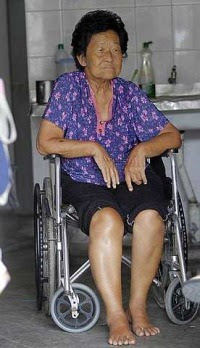A GONG Xi Fatt Choi banner still hangs across the front door of the cheery yellow brick and wooden house in the backwaters of Balik Pulau, Penang, four months after the lunar new year.
The scene reflects Cheng Mah Kim’s optimistic approach to life, but it belies the 71-year-old’s heart-wrenching duty of caring for her three bedridden children.
Cheng and her husband Lee Teik Hun, 78, are too busy to take down the banner because they’re preoccupied with caring for Chuan Beng, Khai Loon and Siew Kee. It’s a 24-hour job but this mother is not one to feel sorry for herself.
At times, the elderly couple relies on the kindness of neighbours and those who know about their plight for assistance. But mostly, they do everything themselves, including cooking, bathing and feeding the children.
The house they have been living in for the past 10 years was the result of a charity drive organised by a Chinese vernacular daily, non-governmental organisations (NGO) and community leaders.
“I have no reason to complain,” Cheng says. “We get RM300 a month from the state welfare department and we have a roof over our heads.
“That itself is such a blessing. We are very grateful to all those who have helped.”
Despite her years and ailing health, Cheng starts her day at four every morning and usually turns in only after midnight.
“At my age, I can’t really sleep in anymore. I get up and prepare breakfast for the kids – they really love coffee.
“Then I give them each a sponge bath. We can’t carry them to the bathroom so this will have to do,” she adds.
Lee will then go to the nearby market on his motorcycle while Cheng cooks the rice at home.
“Teik Hun usually comes back with fish and I’ll just prepare a simple dish for lunch and dinner.
“The kids can be picky. Sometimes they only want to eat bread,” says Cheng, who was in a wheelchair when The Star visited her home recently. She had fallen down a few days earlier and was struggling to dress the children. Her legs were swollen.
Cheng suffers from high blood pressure, constant migraines and pain in both legs. Teik Hun is diabetic. The couple used to sell pasembur on a three-wheel cart when they lived in Jelutong years ago.
“I wish we could continue hawking but then who will take care of the kids?”
Chuan Beng is 43 and his brother Khai Loon is 34. Sister Siew Kee, 38, has a cheeky smile for visitors. But the three of them can barely speak.
“They all had high fever when they were young. The doctors told me they had suffered epileptic fits,” explains Cheng, who speaks Hokkien and a smattering of Bahasa Malaysia.
“I don’t really understand the medical reasons for their condition. I tried sending them to a day-care centre for special kids when they were young but stopped because they refused to go.”
The proud mother says her family makes do with what they have. Their one luxury is Astro because the children are “addicted” to watching TV.
“All this is God’s will. No point worrying about tomorrow. Until the day I die, I will care for my children. It’s not that I don’t want to send them to a nursing home but whenever I try to explain it to them, they will wail and refuse to eat. I don’t want them to die of hunger at an unfamiliar place,” Cheng says.
Her niece, Belinda Lee, adds that the couple has two other daughters who married and left home and are unable to care for their siblings and parents. A fourth daughter died of illness.
“What my uncle and aunt need most are volunteers who can come around to the house a few times a week to help with their children,” Lee says. “The problem is that my cousins are not used to having people around. But, eventually, they will need to move to a nursing home when their parents are gone.
“That is why we are praying that there are Non-Government Organizations that can help prepare them for the inevitable so when the time comes for them to go live in a nursing home, they will not be traumatized.”
Now you know how lucky are we? Yes, we are. ;)
There is nothing much to complain about, but to solve the problem is the most important thing to do.
There is nothing much to complain about, but to solve the problem is the most important thing to do.












